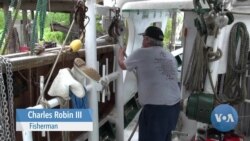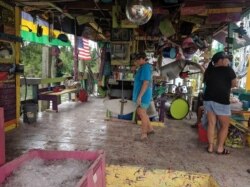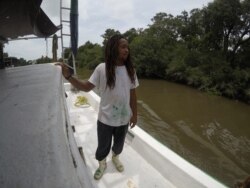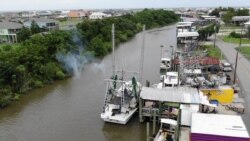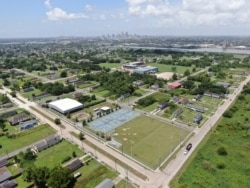VOA Russian Service's Alex Yanevsky contributed to this report.
NEW ORLEANS — In his own words, shrimp runs through the veins of Charles Robin III, 59, a seventh-generation fisherman on the Louisiana bayou and a familiar face in the St. Bernard Parish, 45 kilometers (28 miles) from New Orleans.
Two days after Hurricane Barry spared much of southern Louisiana from major flooding this past week, it was back to business for Robin and his crew. It's "the life we chose," he says reassuringly, standing next to his granddaughter off the side of his boat.
Had it not been for the damage caused by Hurricane Katrina in 2005 — a storm that left him with "three T-shirts, two pairs of drawers, two pairs of shorts" and his boat — he might be close to retiring. Instead, he plans to work another 20 years beside his son, who also works in the business.
The distant future, however, is less certain. Robin can't guarantee that his grandkids will carry on the mantle of the business for a ninth generation. It's long been tough to make a living. Rising tides and worsening weather have made it tougher.
"We're sinking and we're losing land everyday," Lynette Gonzales, who runs Net's Rock-N-Dock shrimp unloading dock, told VOA.
Unloading 200 pounds of brown and white shrimp on Gonzales' dock, deckhand Jeremiah Blaise, 25, says he would like to one day become a captain on his own ship, but only if the weather doesn't stop him first.
"Sometimes you could recover from a bad storm, but if they keep on happening more and more, you got to find another job, find another place to move," Blaise said.
"The place you might move at probably don't have shrimp boats," he added.
Katrina survivors: Worried for their future
If fishermen like Blaise were ever to flee the community of Yscloskey because of hurricane flooding, residents of New Orleans worry they, too, could suffer a similar fate.
Survivors of 2005's Hurricane Katrina — a Category 5 hurricane that led to an estimated 1,800 deaths across multiple states — carry a burden of worry that disaster could strike again.
They are among the 10% to 20% of New Orleans residents who were unable to evacuate before the hurricane slammed the Gulf Coast, placing the city under more than 4.5 meters of water.
Since then, the U.S. Army Corps of Engineers has funneled more than $14 billion for levees and pump stations. But residents across eastern New Orleans aren't confident it will be enough.
"I think that if another storm came through and it was as bad or close to being as bad as [Hurricane] Katrina, I would not stay," Christina Pierre, a mother of six and resident of the Lower Ninth Ward, told VOA. "I would not come back. I would never come back."
Spending his free afternoon fishing for alligator gar on the Lower Ninth Ward's Main Outfall Canal, Earl Davis, 31 — a heating-and-cooling systems engineer at a downtown New Orleans hotel — fears that anything more than a Category 2 hurricane — where winds range from 154 to 177 kph — would "destroy" the ward.
"The city's pumping station, which is the drainage systems, are basically garbage. One day we can get a simple 20-minute rain and the streets will flood," Davis said.
In 2005, after a levee collapsed to the east of the Lower Ninth Ward, Davis sought shelter with his family and 25,000 others, cramped in squalid conditions at the city's convention center before spending an additional two days camped on an interstate highway.
Traumatized at age 17, he says the fear of something just as bad or worse remains very real, especially in a neighborhood like the Lower Ninth Ward, a majority African-American neighborhood where more than 32 percent of residents live below the poverty line.
"There's not very much development here, so I don't think the officials see anything to protect," Davis said.
"We've been fortunate enough to dodge a couple bullets in these hurricanes," he added, "but I don't think that's going to happen often."




